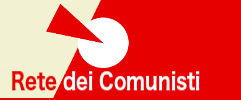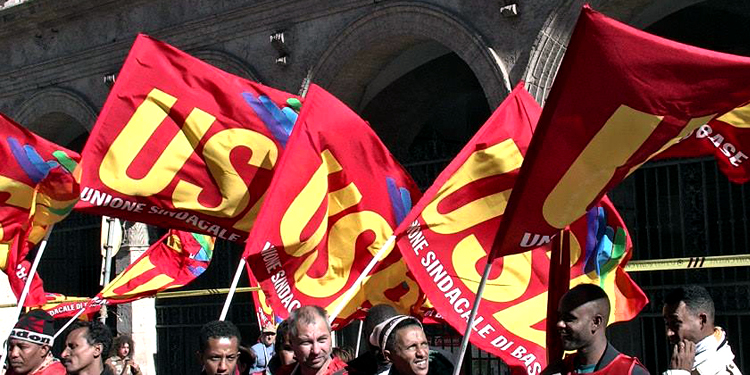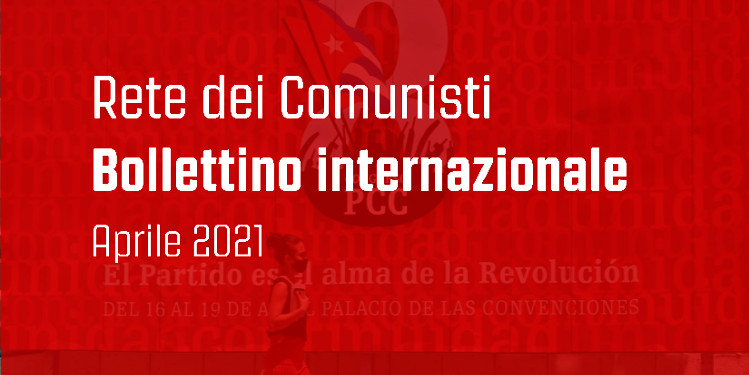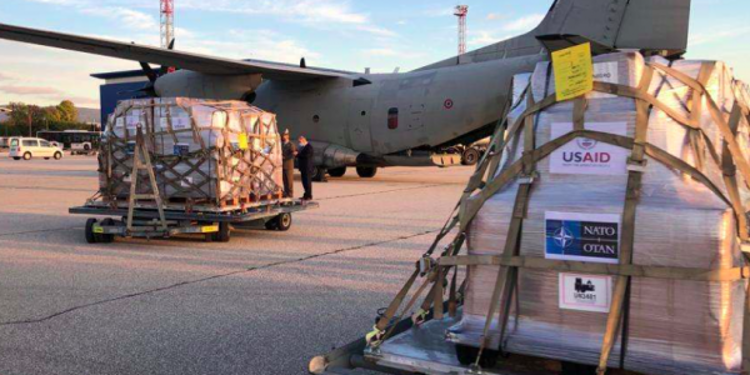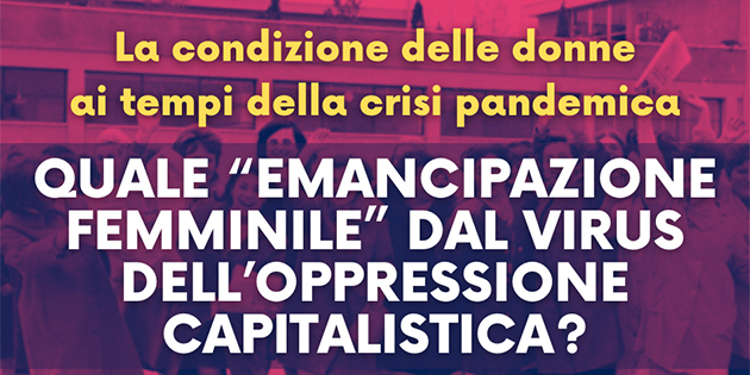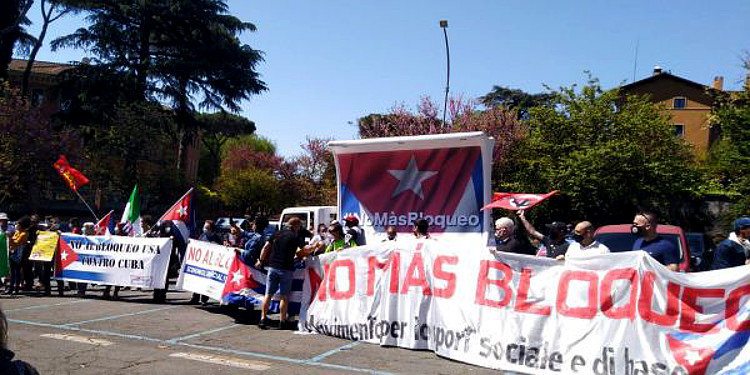| english | español | français | italiano |
Interview to Cinzia dalla Porta USB
Internationalist activity is one of the core aspects in the activities of USB which adheres to the FSM-WFTU.
This trait of USB’s militant trade unionism is increasingly intertwined with relevant issues affecting working men and women in Italy.
The USB, despite the difficult conditions in which it has operated due to the pandemic, has created campaigns, individual initiatives, and training sessions on a wide range of issues with a strong internationalist character.
We talk about this with Cinzia della Porta from the USB National Executive in charge of the international department.
Q: Let’s start with a general overview of what is the activity of the International Department of the USB and how it relates to the activity of the World Federation of Trade Unions and its member unions, in particular those countries that are part of the EU?
A: Internationalism is an essential element of the USB, in theoretical and practical terms. It is the thread that links us to the history of the best class union movement of the 20th century. A history that finds material continuity in the World Federation of Trade Unions and our natural positioning within it.
We joined the FSM-WFTU in 2010, after the founding congress of USB. Today, after the years of crisis following the end of the USSR, the FSM-WFTU is an internationalist trade union organization with new characteristics that has been structured on all continents through the construction of regional offices and categories that do very important work at a global level. Its growth and work have been strongly opposed by the ITUC, the International Trade Union Confederation, to which the collaborationist unions, including CGIL, CISL, and UIL, belong. Today the FSM-WFTU has 105 million members in 130 countries and continues to grow. At the European level USB is in the European secretariat of the FSM-WFTU and the world secretariat of the public sector structure.
In recent years we have developed an intense international activity, linking internationalist solidarity to the more general class conflict, which reflects the will and strength that workers still express, even today, in every corner of the planet, as demonstrated by the great movement of Indian farmers, the claims of the peoples of Latin America, but also those of the dockers and workers in the United States, who have joined the battles of the Black Lives Matter Movement. The list of places of conflict is very long, and it also affects our troubled continent, affected by the policies of a European imperialist pole under construction, which cynically uses the pandemic to carry out continental restructuring processes, at the service of multinational pharmaceutical companies and the various leading sectors of production, infrastructure, and advanced services. The struggle for the proceeds of the Recovery Plan is proof of this.
International activity is and will increasingly become a defining element of our union, an inseparable part of our commitment to building a class, unitary, independent, confrontational union in Italy
But our internationalism does not just stop at the fundamental link with the conflict that confronts us daily with our class enemy. The reasons that lead us to give strength to this area of intervention go beyond the field of bargaining, taking shape as an integral part of the great inspiration that has always moved the international workers’ movement towards overcoming the economic relations imposed by the capitalist mode of production, the sole source of the suffering of mankind and nature.
For the USB, being internationalists means directing the economic struggle towards breaking this profoundly unjust and irrational system, for the construction of Socialism in the 21st century, the only possible way out of the barbarity of today
On this ground, real common paths of struggle are emerging at the international level, revealing the karst lines of the ever-changing value chains, implemented by big capital in the constant search for maximum profit. A scenario where the old assembly lines delocalized to the peripheries of the planet coexist alongside the super-exploitation of logistics chains, business services, and the exploitation of mental labor on digital platforms in the countries of the imperialist center.
The growth of awareness within USB of the importance of this front is increasingly perceived by our intermediate framework, but there is still a lot of work to be done, and we need to be even more committed in the near future.
In the face of the challenges imposed on us by our class enemy, lingering in a vision that is only national or, even worse, a simple dispute-oriented one, would take USB off the track of history, of a world running towards new social conflagrations, the result of the irreducible contradictions produced by the capitalist mode of production.
Q: One of the central issues for USB is the contrast to the policies imposed on (not only) Italy by the European Union and in general a radical critique of this strongly anti-democratic device. The failed management by the EU of the Covid-19 containment and vaccination campaigns is part of this pattern, in a context where cuts to the health sector – mainly due to the austerity policies dictated by the EU – have dismantled the National Health System. Can you tell us how USB has carried out and will carry out its broad mobilization activities on this issue, combining it with criticism of the EU cage?
A: We, like everyone else, are wondering about the consequences of Covid 19. It is now clear to everyone that the capitalist system came off worst from this harsh challenge that is killing hundreds of thousands of people, clearly demonstrating not being able to ensure a future for humanity. Above all, it is now extremely clear what are the results of policies of robbery of resources and dismantling of every system of collective protection that, in our country but more generally throughout the world, had been affirmed thanks to the struggles of the workers’ movement after the end of the Second World War and, essentially, until the fall of the USSR. Now it is clear that a very hard struggle is opening up to prevent the exit from the pandemic crisis, which has turned from a health crisis into an economic and social crisis, from being at the expense of the working classes and from being an opportunity to change the balance of power between capital and labor for the worse, for example, by changing the contractual system for the worse or by introducing Smart Working to introduce further flexibility and an increase in time and workloads. The game being played by our “entrepreneurs” and the multinationals is for capital to appropriate the available resources and thus manage to get through a crisis that is largely the result of its criminal management of power almost unscathed. The enormity of the resources that Europe and the governments of the countries involved are pulling out is staggering and should make it clear to everyone that the austerity policies to which governments and the EU have forced millions of people for years, strangling entire economies and massacring the lives of ordinary people, are the result of economic choices and not of a real lack of resources. The current clash, in which it is necessary to take part, is therefore to determine where and to whom the resources provided should be directed and how the state should return to playing a general and decisive role in the management of these resources and, ultimately, in the economy. It is clear that the entrepreneurial system, mindful of the glories of Italian- style assisted capitalism, is trying in every way to secure the largest slice. We, therefore, have two fundamental tasks: one is to make the analysis of what is happening a common knowledge, of what the real causes are, starting from our organizational structure so that it can reach every workplace, every neighborhood through a wide and in-depth training of cadres; the other is to hold together the struggles that will certainly be the key to the coming months and years. It is obvious that the economic and social consequences of the post- Covid era will not affect everyone in the same way, even if everyone will have profound scars for a long time.
The task of a class organization is to hold together at the confederal level all the impulses for the struggle that will arise, orienting and directing them so that the classic game of the ruling classes of using different interest groups against each other to prevent the struggles from having a strong impact does not succeed once again
In these ten years, we have gone through difficult and complicated situations, but our organization has always been able to come out of them thanks to its capacity for analysis, investigation, and forecasting and thanks to the organizational structure we have given ourselves. I believe that also in this phase the whole USB will be able to occupy the trade union, social and political spaces that will open up and to successfully engage in the battle we are facing.
Q: USB supported the campaign to award the Nobel Peace Prize to the Henry Reeve Brigade of Cuban doctors who also operated in Italy during the first pandemic period. As you rightly wrote: “The Nobel Peace Prize to these men and women, who faced with every catastrophe are ready to leave their country and their affections to risk their lives on behalf of unknown people, is a reward for the conception of the world they represent, at a time when the very existence of the humankind is in danger, due to the irrationality of an economic system that still dominates a large part of the planet.” Can you tell us the reasons for this campaign and how it is carried out?
A: We have carried out an intense campaign in terms of both quantity and quality; the approach and the reasons were to highlight that the terrible situation our country is experiencing is not the result of bad luck but of very specific political choices, choices made both in the management of the pandemic and previously: that is, prioritizing profit and sacrificing the health and lives of citizens. That is to say comparing the rationality of capitalism with the rationality of a socialist system like Cuba, which is not only safeguarding the lives of its own people but has also sent its own brigades of doctors to help various countries around the world.
We have seen a small island subjected to an economic blockade that at a terrible time sends its doctors to one of the richest places in the world, Lombardy. This is the materialization of internationalist solidarity under the eyes of a people, the Italian people, who at the same time were witnessing the closure of the European Union’s borders and thousands of deaths.
Covid-19 pandemic again compared two radically different social and economic models, which gave both immediate and structural responses to the pandemic, with diametrically opposed results. This is what we have been discussing in our activities supporting the Nobel Prize to the Cuban medical brigade.
We have carried out many events, as USB and FSM-WFTU, a first national conference to launch the campaign involving, among others, the general secretary of the FSM-WFTU and the representative of the Cuban trade union, followed by an event in each region. The aim was to discuss the issue within our organization most broadly and extensively, involving first and foremost the health and research structures, which today increasingly represent the failure of the capitalist system.
As we have said throughout our path, Cuba has already won the Nobel Peace Prize to us and we will continue to draw inspiration for our work from that socialist experience, bringing support and solidarity to the Cuban people and government.
Q: The USB paid particular attention to Palestine and concrete actions in its support. I am thinking in particular of initiatives in support of Palestinian political prisoners held in Zionist jails and for the military embargo against Israel, with which Italy, unfortunately, collaborates several leading sectors. The trade union’s activity is precious, given the alignment of the political formations of the whole institutional framework and the overwhelming focus of the Italian media on Israeli needs. Can you explain to us what is the approach of USB and what are the actions undertaken?
A: USB has always been at the side of the Palestinian people, through campaigns, events, moments of struggle, and also by bringing our concrete solidarity directly to Palestine. The Palestinian class unions that have no ties with Israel are affiliated with us to the FSM-WFTU, the activities we carry out (of struggle and counter- information) are based on our and the FSM-WFTU’s anti-imperialist and anti-capitalist character.
We have been to Palestine more than once and directly experiencing the life of the Palestinian people is devastating. An entire people forced into a cage, surrounded by walls, barbed wire, and checkpoints.
Speaking of normality in Palestine is an oxymoron. Any form of normal everyday life is denied. In solidarity with the Palestinian people and workers, since 2016 we have given USB formal membership to the international BDS campaign – Boycott Divestment Sanctions, against the State of Israel
A campaign that we believe can have significant effects internationally, through increased democratic pressure to stop the crimes committed by the Israeli state against the Palestinian people, similar to the successes of the BDS campaign against South Africa’s Apartheid regime.
In our meetings we are also encouraged to develop constant pressure on the governments of the various countries and the EU, calling in particular for the interruption of all scientific and academic cooperation with Israel. We have recently joined the international campaign for the release of Palestinian children from Israeli prisons and participated in the initiative to present the BDS dossier on the arms embargo on Israel, and we will also promote other similar events.
Q: An important part of the working class that has expressed greater combativeness in Italy works in logistics and in agricultural work, where USB has an increasingly important organizational presence. Some of those same workers of Indian origin organized by USB who are fighting for better overall rights and not only for work have mobilized in support of the struggles of Indian farmers against the legislative package approved (though suspended) by Modi’s government in India which overturns conditions in agricultural work.
How has USB supported this struggle?
A: The response is twofold, encompassing both the struggle of the logistics workers in our country, composed mainly of immigrant workers and the concrete solidarity given by USB to the Indian farmers, which has seen the natural exposure of workers from that country present in Italy, employed in this sector.
With regard to logistics in our country, we can say without fear of contradiction that USB’s trade union and organizational support was a fundamental element in the development of the conflict in Piacenza, the epicenter of the first wave of strikes, which cost the life of Abd El Salam, our union militant crushed by a “boss” on a truck in the evening of 14 September 2016, during a picket in front of the GLS company. A victim of a very harsh conflict, which still pits workers against bosses in a strategic sector for the capitalist production system. A conflict that has continued in recent years in Piacenza and other cities and regions, obtaining concrete results in terms of rights and opening up previously unimaginable bargaining spaces. It is a struggle that continues, finding nourishment and strength in a young working class that is not conditioned by the defeats suffered by our working class in all these years of backwardness, caused by the complicity of the confederal trade unionism and anti-worker legislation that is among the worst in Europe, thanks to governments of the right and false “left”.
In this context, the solidarity of the Indian workers in Italy with their compatriots fighting against a bill that, if implemented, would set back the rights won by the farmers of the Indian continent by a century has been genuine. Just as natural has been the solidarity of USB, through a series of activities conveyed worldwide by the FSM-WFTU alongside the largest mobilization in the history of the peasant movement worldwide, obscured only by the servility of our mass media.
Q: Italy is part of NATO. The new North American administration seems to want to use the Atlantic Alliance as an instrument to launch a new Cold War against China and Russia. The individual member countries are expected to contribute to this renewed war policy by allocating as much as 2% of their GDP to NATO-related war spending. Because of the EU’s budget mechanisms, this means – for Italy, but not only there – further cuts in welfare funding. How will the trade unions act in this context of a warlike tendency and an increase in military expenditure not linked to any concrete threat?
A: Capitalism has always used, in conditions of systemic crisis, the weapon of wartime as a last resort to recover political hegemony and, above all, the ability to resume its hellish system of exploitation and profit maximization.
Once again, as in other historical phases, capitalism in its imperialistic phase is facing a crisis of unprecedented depth, which takes on ‘systemic’ characteristics, involving not only the economy but also the environment and its ‘objective’ limits, spilling over into the whole of society, scarred by over thirty years of fiercely neoliberal policies that have laid the foundations for the current manifest inability to manage the pandemic
Public healthcare, reduced to its lowest terms, is exactly the product of those policies, turning into a noose around the neck of the majorities. A crisis that involves the very legitimacy of the ruling classes in the various Western imperialist countries and poles, clearly unable to maintain a stable political and ideological hegemony, producing power vacuums filled by figures like Trump, Bolsonaro, Johnson or like Draghi in Italy, representing the failure of an entire national ruling class, unable to manage the “expansive” policies of the Recovery Found.
In this situation, it is natural for capitalism to push for a new cold war, managed by the ‘democrat’ Joe Biden, who is outdoing his predecessor in terms of provocation and shamelessness. The obvious targets of the decadent stars-and-stripes imperialism are the direct economic antagonists, starting with China and Russia, which are inseparably linked with a series of other countries unwilling to submit to US and EU diktats.
We are, therefore, facing a new historical period of great upheaval, where the option of generalized war – the only one that could meet the needs of destruction/reconstruction sufficient to give capitalism a new lease of life – is held back by the widespread possession of atomic weapons and by power relations that have changed profoundly in the short period that separates us from the beginning of so-called “globalization” dominated by the United States
The International Workers’ Movement and the class unions that have nourished it have always sided with the peace and anti-war movements. This is the ‘mission’ of USB, which has fought and will fight with all its might against military spending, militarism, and the war effort.
It is not only an ethical struggle against the barbarity of war, but also a material one. Military spending takes the lifeblood out of a welfare system already prostrated by more than 30 years of cuts and anti- worker policies, aimed at extracting maximum profit where it is still possible for an agonizing system: wages and pensions.
All our efforts will be concentrated on uniting these elements, in order to make it possible to relaunch a strong anti-war movement. We have to make comprehensible to the broad masses the meaning and value of this battle for the maintenance of peace, overcoming the stereotypes of self-referential pacifism, involving the old and new figures of wage labor in this battle for the survival of humanity, which can continue to exist if it can get rid of capitalism.
Q: One last question: this year the FSM-WTUF Congress is scheduled to take place in Vietnam in December. Can you tell us about the value of this appointment in a context still strongly marked by the pandemic, in a country that has been characterized by one of the most virtuous managements in containing the spread of the disease?
A: A very important appointment, especially because of the enormous work that the FSM- WFTU is doing all over the world and the need for the definition of the class union that is necessary for this historical phase.
Added to this is the fact that the congress is being held in a country that has responded to the pandemic in a completely different way from capitalist countries, i.e. in a country that has priorities other than the profit of capital.
It will be a decisive moment for all of us also to redefine the internal structure given the great growth we have had in recent years since the last congress in Durban in South Africa.
